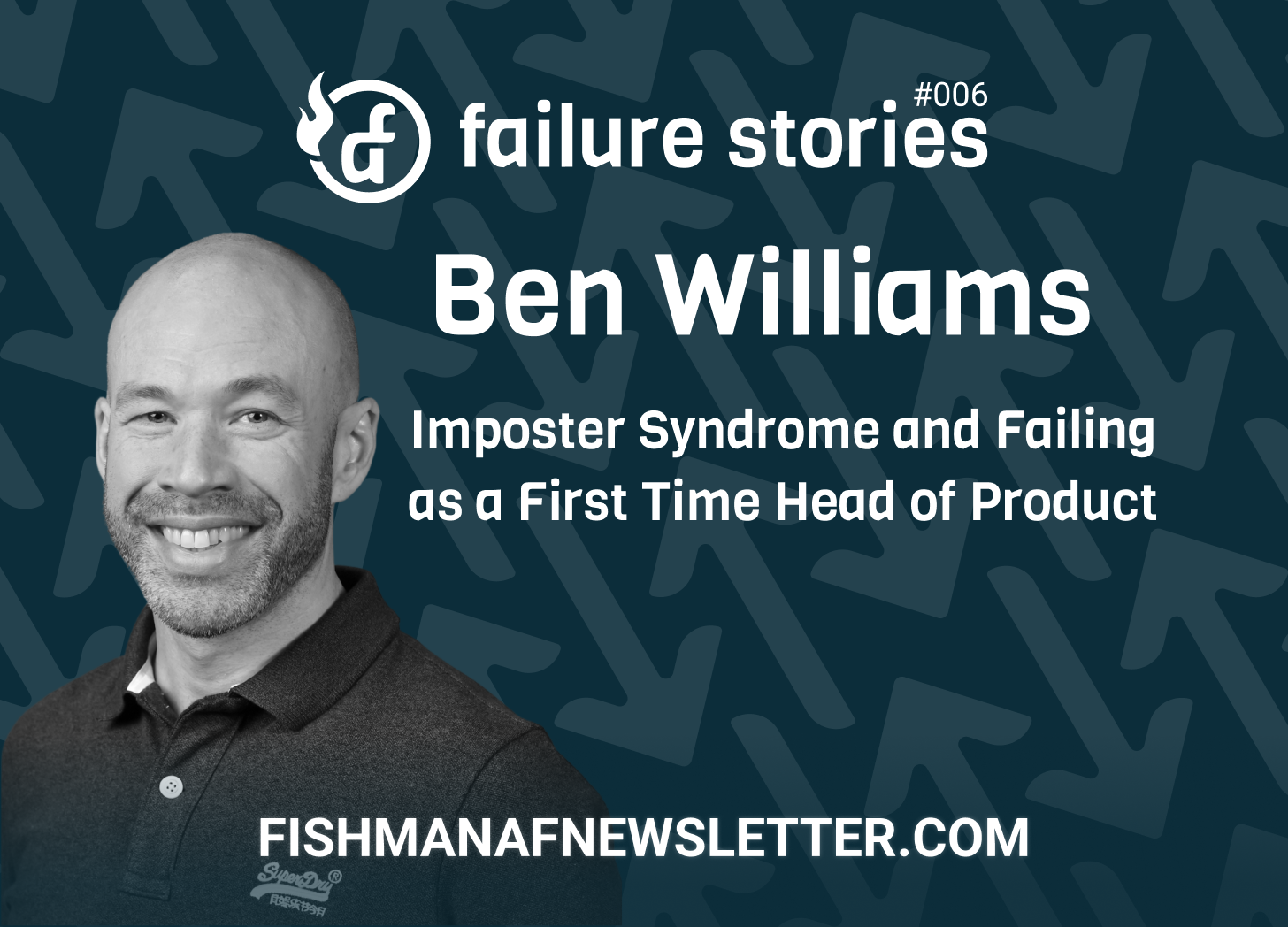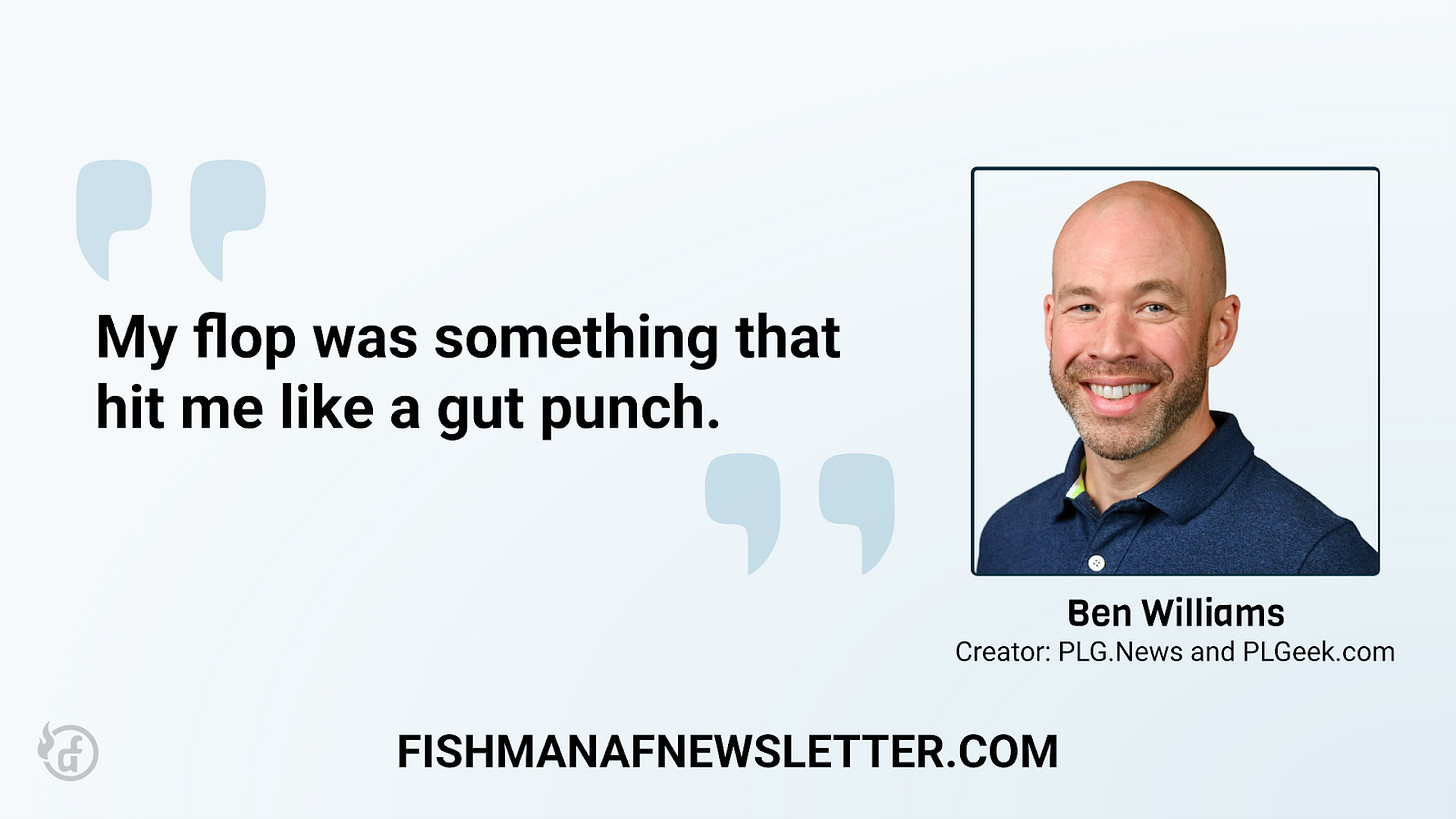Failure Stories Volume 6
Ben Williams, fmr VP Product at Snyk and current PLGeek extraordinaire shares lessons learned in his first Head of Product role and battles with Imposter Syndrome
Hi there, it’s Adam. 🤗 Welcome to my weekly newsletter. I started this newsletter to provide a no-bullshit, guided approach to solving some of the hardest problems for people and companies. That includes Growth, Product, company building and parenting while working. Subscribe and never miss an issue. Listen to my new podcast about fatherhood and company leadership - Startup Dad. Questions? Ask them here.
Welcome to the sixth installment of Failure Stories. Here are the last several:
Elena Verna (Head of Growth and Data at Dropbox) says the quiet part out loud
Leah Tharin (Interim CPGO at GotPhoto) shuts down her startup too early
Tom Willerer (COO of Reforge) shares a product flop and failed career move
Gina Gotthilf (COO and co-founder of Latitud) talks about making the “safer” choice
Dan Wolchonok (VP, New Products) deleting the production database at Reforge
Chris Hatfield (Director of Product at LinkedIn) builds the wrong product then doubles down
In Product we prototype because we know that on a great day only 30% of our solutions will actually work. In Growth we experiment for the same reason. Even the smartest and most talented among us get it wrong, have moments of immaturity, and learn some painful lessons.
The party line is that failure is “OK” because it’s about learning. But, when it comes down to it, is it really okay to fail? Why do we struggle to admit that we’ve failed at something?
Because it’s so hard to admit failures, I'm publishing this recurring series on the stories of some of the most successful leaders and the struggles along their journey to success. My hope is that this normalizes the losses and mistakes that we’ve all experienced but are too afraid to share.
Ben Williams is the author of PLG.News and the PLGeek. In case you couldn’t tell he’s big into Product-led activities. He is an advisor to many product-led companies, the former VP of Product at Snyk, and the Head of Product at Cloudbees—the role that today’s failure story is all about. He has also been a guest on the Startup Dad podcast and brings a dash of British humour (see what I did there) to everything he does.
Note: Ben wrote a bit about this experience on his own newsletter (paid subscription)
What would you consider to be the biggest professional failure of your career?
Failure in product management often brings to mind botched product launches or failed experiments, but Ben’s experience as a first-time head of product reveals a more profound and personal dimension of failure. His story is not about unmet hypotheses or disappointing metrics but about a gut-wrenching realization that struck at the core of his professional identity.
Ben describes it,
"It’s nothing to do with product launches or experiments that didn't deliver the results we hypothesized - those things are just part of doing product and growth and the built-in learning cadence.”
Ben entered his first head of product role with a strong track record as an individual contributor and lower-level PM leader. He had earned respect from his peers across product, design, and engineering teams. But beneath this surface of confidence, Ben was grappling with intense imposter syndrome. He had yet to learn how to channel this self-doubt into something constructive.
Instead, he chose to overcompensate:
"I had a lot of respect from my peers and folks in the product, design, and engineering teams. But I was also suffering a lot with imposter syndrome, and at this point in my career hadn’t figured out how to use it to my advantage. As a result, I tried to overcompensate by having all the answers."
This overcompensation manifested in several bad behaviors. Ben began to micromanage product decisions, inadvertently disempowering his team. He worked on strategy in isolation rather than collaborating with his colleagues, missing out on valuable input and collective wisdom.
He recounts this experience:
"I felt like I had to have all the answers and that I’d be judged negatively if I didn't. I leaned into product decisions that I didn’t need to and disempowered people in my team. I worked on strategy in a vacuum instead of riffing on it with my team."
In essence, his fear of being seen as anything less than a flawless and exemplary leader caused him to embody the very traits of a poor one. There’s an irony here and the consequences weren’t great. He eroded the foundations of trust and respect that he had worked hard to create.
He turned it around thanks to the candid feedback from his team and the guidance of an executive product coach (editor note: here’s some advice if you’re looking for a coach).
With their support, he embraced a more collaborative and open approach to leadership. They say that trust is gained in drops and lost in buckets. This was true in Ben’s case. The initial period of turmoil lasted around four months, it took several more months for Ben to rebuild the trust he had lost. The process was painful but provided a valuable lesson in vulnerability and humility as a leader.
How did that experience shape you; how did you transform it into a learning opportunity?
When Ben first had to face his leadership shortcomings, the revelation was jarring.
"When it was first pointed out, it was difficult for me to accept it because it was so surprising. I really had a complete blind spot about what was going on - it was all subconscious."
This blind spot had obscured the impact of his actions on his team and himself. He wanted to provide guidance and direction but that morphed into overreach, stifling the creativity and autonomy he wanted to foster.
Ben believed he was doing the right thing.
The true turning point came after a couple of weeks of consistent feedback from his colleagues. As Ben recalls, "After a week or two of hearing similar things from different people, it all started to come into focus." This collective feedback finally broke through. The realization was humbling and, at times, deeply uncomfortable.
"I felt really embarrassed. I was embarrassed by how I’d been as a leader, and at the fact that I hadn’t really realised it."
Ben's initial reaction of embarrassment quickly transformed into a constructive force.
He began by addressing the situation head-on with his team.
"I apologized to my team - they appreciated that."
This act of started the process of rebuilding trust.
Recognizing the need for external support, Ben turned to his executive coach and sought advice from other mentors. These mentors provided valuable insights and strategies that Ben could implement to improve his leadership style. The process of self-reflection and external guidance helped Ben transform his approach to leadership, making him more collaborative, open to feedback, and empowering towards his team.
In the end, the entire humbling experience became the foundation of Ben's professional development.
"The whole humbling experience actually materially shaped how I approach building and scaling teams in product and growth."
By embracing vulnerability and actively seeking to improve, Ben emerged as a more effective and empathetic leader. His story underscores the importance of self-awareness, continuous learning, and the willingness to change. For Ben, the painful period of introspection and correction salvaged his career by making him a stronger and more resilient product leader.
Conclusions and takeaways
Ben's story underscores a very important lesson for aspiring product leaders: success is not just about making the right decisions but also about fostering an environment of trust, collaboration, and openness. Imposter syndrome can be a powerful force, but it doesn’t have to drive fear and isolation. As Ben learned, when you manage it correctly it can lead to growth and improvement. The failure that initially seemed like a devastating setback became a learning experience and reshaped his approach to leadership.
Ben's experience serves as a reminder that the journey of a product leader is as much about personal growth as it is about professional achievements. Ben overstepped with his team and eroded their trust in him, but by embracing his vulnerabilities and learning from his mistakes, Ben was able to emerge as a more effective and compassionate leader.
I’m so appreciative that Ben shared this story with me. If YOU have a failure story that you’d like to share or any feedback on this series please reply and let me know.
Don’t forget to sign up for Ben’s PLG.News newsletter!









